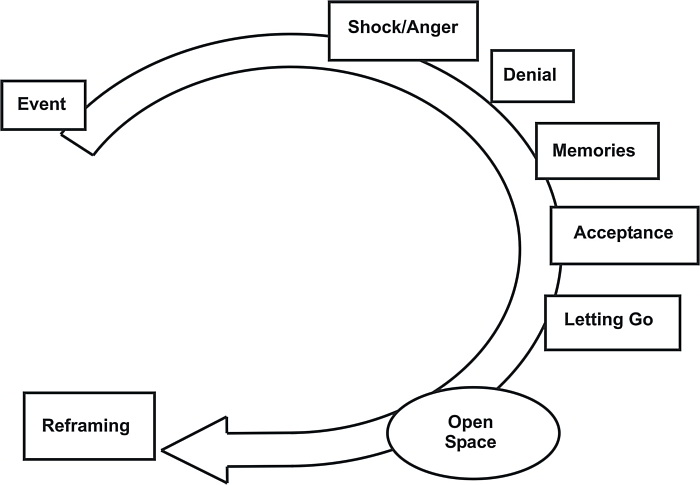
Transforming Grief and Loss
Are you feeling grief and loss?
 Many people in our world are in the depths of experiencing and feeling grief and loss. If this is you, then you are not alone in that feeling. It's everywhere: the loss of work, the loss of freedom, the loss of loved ones from death/separation, the loss of health, or the loss of a way of life. The world is experiencing accelerated and dramatic change. Whenever there is change, even positive change, it can trigger grief.
Many people in our world are in the depths of experiencing and feeling grief and loss. If this is you, then you are not alone in that feeling. It's everywhere: the loss of work, the loss of freedom, the loss of loved ones from death/separation, the loss of health, or the loss of a way of life. The world is experiencing accelerated and dramatic change. Whenever there is change, even positive change, it can trigger grief.
With grief and loss being so pervasive in everyone's experience of life, we all need effective, holistic tools, methods and support to work with it and shift it. If we don't, it can add excessive drama and suffering to our story and adversely affect our quality of life, our health and our relationships.
The Grief Cycle
In 1969, Elisabeth Kübler-Ross, in her book, On Death and Dying, proposed that people, when exposed to a significant event of loss or change, cycle through stages of grief with accompanying emotions until they are finally ready to accept, let go and move on.

Feelings and cycles of grief and loss are normal. Depending upon the person and the experience, a person can spend moments in each stage of the cycle or months and even years. In some cases, people get stuck for their entire life, only to let go in their final breath. Grief can also be suppressed or "numbed out," but while it may not be consciously felt anymore, suppressed grief can have detrimental, unhealthy consequences. To maintain optimal mental and physical health, grief needs to be fully processed.
As an aside, grief and loss is also a shared experience in our collective consciousness. At a collective/group level we are seeing the consequences of unprocessed grief and loss everywhere in our society right now. It is showing up in blaming, shaming, rioting, depression, drug abuse, conspiracy theories, and in later stages of the grief cycle — forgiveness, compassion and empowering movements for positive change.
In my own experience, the core feelings of grief and loss are often much deeper than we think. While there may be a recent event that triggered a "current" cycle of grief, this grief is often weighted with layers and layers of past, unprocessed grief that goes way back into a childhood experience. When these core childhood experiences are properly processed, the whole complex of grief weakens and can be transformed. This does not need to take a long time but it does need our presence and attention. It is like pulling a significant brick out of a dam, resulting in the whole dam collapsing — the water(tears) begin to release and flow.
It is unfortunate that most children in our cultures are not taught to effectively process grief. Instead, our parents or caretakers tell us, "Big boys/girls don't cry" or they get angry with us for crying, or maybe give us a cookie to "make things better." This parental conditioning only teaches children to feel shame, suppress feelings, or develop habits of emotional eating. The grief gets stuffed in a psychological bag to carry around for the rest of our lives and the bag 'explodes' whenever someone or some event pushes that emotional button. We "lose it," usually out of proportion to the situation, and the flood gates of anger and grief open wide!
 The greatest loss, and I feel it is at the core of human suffering, is the rejection and loss of "parts" of ourselves. We lose our sense of wholeness. This starts early in life when traumatic experiences cause us to lose, push away or reject parts of ourselves in order to feel loved, to fit in, or to just survive. These “parts” become hidden shadows of ourselves — banished into the background of the psyche or into projections onto the world. These shadow parts could be emotions like anger, and joy but also labels like "lazy, worthless, stupid," or "beauty, playfulness, power and brilliance." In the process of losing these parts, we become a fragment of our whole self and polarized within. These lost parts and the drama that they then create, subconsciously and persistently follow us around in life until we reach out and embrace them. We can never truly be happy and wholly free until we embrace these parts and acknowledge the gifts they have for us. This process of claiming our wholeness is called "shadow-work." In my experience, it is at the core of life mastery.
The greatest loss, and I feel it is at the core of human suffering, is the rejection and loss of "parts" of ourselves. We lose our sense of wholeness. This starts early in life when traumatic experiences cause us to lose, push away or reject parts of ourselves in order to feel loved, to fit in, or to just survive. These “parts” become hidden shadows of ourselves — banished into the background of the psyche or into projections onto the world. These shadow parts could be emotions like anger, and joy but also labels like "lazy, worthless, stupid," or "beauty, playfulness, power and brilliance." In the process of losing these parts, we become a fragment of our whole self and polarized within. These lost parts and the drama that they then create, subconsciously and persistently follow us around in life until we reach out and embrace them. We can never truly be happy and wholly free until we embrace these parts and acknowledge the gifts they have for us. This process of claiming our wholeness is called "shadow-work." In my experience, it is at the core of life mastery.
So what can you do to release and transform grief and loss? Here are some tips:
- Acknowledge and accept what you are feeling. It is natural to feel anger, sadness etc.
- Make time to be fully present with the emotions that are showing up without trying to make them go away — being OK if they subside or even get stronger. Emotion is "energy-in-motion." It is important to feel them and just witness the energy that is in motion. Get a diary and write — pour your feelings out onto the pages.
- Feel the layers as they arise. Feelings of grief usually come in waves. Whenever a new wave comes, BE with it again. It does not mean that your grief work is not working, you are just working through the layers.
- Join a grief group where you can share what you are going through as others listen and witness. Story-telling or listening circles are embedded in most indigenous cultures because they work well for both individual and collective grief work.
- If you are ready, work with the past grief that has been triggered in the current incident. When was the first time you felt the way you feel now? What happened? Allow your subconscious to bring up past losses and trauma for processing, forgiveness and letting go. After feeling the feelings, you could imagine sending love, light and forgiveness back to that incident and the people associated with it, including yourself.
- Investigate any shadow parts that might be associated with the current experience. This is deeper, more specialized work and you might need help. All the previous work will help and is part of the whole process, but shadow integration work is where amazing transformation occurs. In my experience with clients, this is often the "brick in the dam" that sets them free and it sometimes only takes a single focused session.
If you are ready to transform your layers of grief and embrace your wholeness and you need a mentor and guide to help you in your process, then contact me. Let's have a chat to see if we are the right match to do this important work.
Search Blog
Subscribe to Blog
Recent Posts
Categories
Tags
abundance action Affirmations Anger Awareness Balance Beliefs Breakthrough Brilliance Change Compassion Connection Conscious Mind Consciousness control Dark-side Decison Divinity Ego Emotions Fear Flow Forgiveness Freedom Gandhi Genie Goals God Happiness Heart Home Inner Child Inner Voice Intuition Knowing Law of Attraction Leadership Life Limiting Beliefs Love Magical Manifestation Mind Miracles Morphogenic Field Now Peace Play Possibility potential Power Principles Purpose Relationship Scarcity Self Fulfillment Separation Shadow Shadow-Self Soul Spirit Spirituality Story Subconscious Mind Super-Conscious Mind Surrender Synchronicity Terrorism Trust Values Vision Who am I WholenessAbout Richard
Richard Schultz will guide you to unlock your true potential, authentic power and inner wisdom to create your extraordinary, high impact life. Courses, life coaching and dialogue with Richard can help you live your legacy and build capacity to thrive with change!

|
Copyright © 2025 J. Richard Schultz All Rights Reserved Privacy Policy Terms of Use |